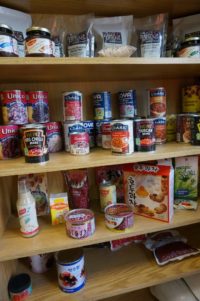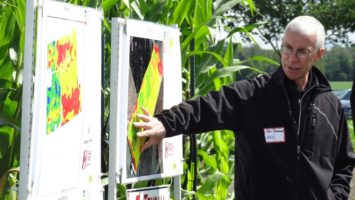
Ontario co-op worldwide leader in edible beans
Food in Canada
Food In Canada Fruit & Vegetables AgInnovation Ontario beansHensall District Co-operative Inc. is a global leader in the edible dry bean and food grade soybean business
 White beans stewed in tomato sauce
White beans stewed in tomato sauce By Kelly Daynard for AgInnovation Ontario
When you drive into Hensall, Ont., just off the shores of Lake Huron, the elevators at Hensall District Co-operative Inc. (HDC) are the first thing you see.
Towering over the small town, they’re an indication of the importance of the business to the rural community – but their significance is much greater than that. HDC is one of the largest agricultural co-operatives in Ontario and a worldwide leader in the edible dry bean and food grade soybean business.

A display at HDC’s Hensall location shows the diversity of the products made with beans from the facility. (Photo source: Hensall District Co-op, AgInnovation Ontario)
HDC’s history dates back to 1937 when a group of farmers joined together to form the “South Huron Farmers’ Co-op”. Today, it has a membership of 5,000 and employs 500 people at 25 locations (24 in Ontario and one in Manitoba). In 2016, its sales are projected to reach $700 million.
Most of the 300,000 acres of beans grown under contract to HDC are Identity Preserved (IP) soybeans and food grade beans with significant testing and documentation done from field to the end user to protect that designation.
HDC has always had a strong commitment to innovation – both in fields and their facilities – ensuring that their farmers have the latest technology available to grow the best crops possible.
Steve Redmond, the company’s Precision Ag Specialist, says, “HDC has access to some of the world’s most sophisticated UAVs, analytic software, data and products to help make decisions on farms easier.”
A team of 25 Field Marketers (most of them Certified Crop Advisors) are visiting farmers throughout the growing season to answer growers’ questions to make their farming enterprises more profitable.
Most of HDC’s technology uses GPS data to provide a complete reading of what’s happening in a field – including soil characteristics, insect, fungal and weed threats, and environmental pressures.
One example is a fully online field recording system called FieldTrace. It’s a secure, web-based system that enables member farmers to link their fields to their crops and contracts, log product applications and then access that data from their computer, tablet or smart phone. Year by year, it provides historical data as well the documentation required for IP contracts.
“Through our services, our team really wants to give our producers all of the knowledge possible about their crop management programs and farming practices to help increase their crop quality and crop yields,” says Redmond. “If we do that, we all come out ahead.”

Steve Redmond shows a field map and explains what the GPS technology is able to identify. (Photo source: Hensall District Co-op, AgInnovation Ontario)
In 2015, a $39 million expansion saw much of the Hensall facility and its 110,000 square foot warehouse become fully automated.
The packaging plant processes 50 metric tons per hour in totes or 2,100 bags per hour. When a pallet is loaded, signals are sent to one of five automated guided vehicles (robots) which will pick it up, and take it to the proper warehouse location. Even the replacement of batteries in the robots is done automatically.
In the fall, the receiving facilities are operational around the clock with a receiving capacity across all locations of four million bushels per day. Once cleaned to customer specifications and processed, the beans are shipped around the world.
Last year, the company’s logistical division shipped edible beans and food grade soybeans to 65 different countries – or approximately 23,000 ocean shipping containers of edible beans and food grade soybeans.
In the future, HDC will continue to focus on new and innovative technologies as well as upgrades to current facilities.
This article is provided by AgInnovation Ontario, a project of the Agri-Technology Commercialization Centre (ATCC). The ATCC is funded by Growing Forward 2, a federal-provincial-territorial initiative.
Print this page